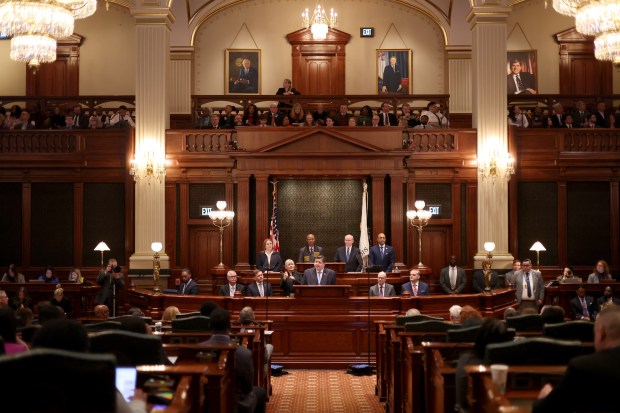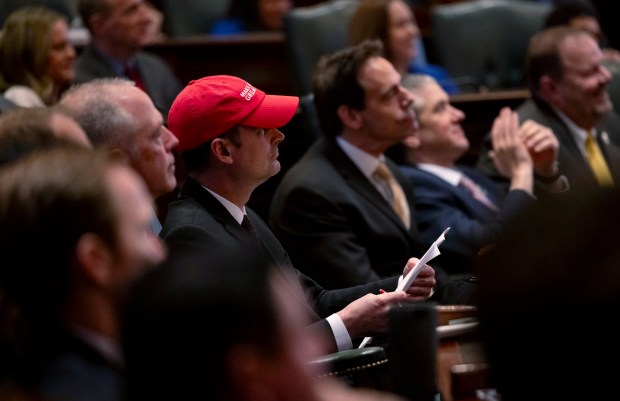For just over a half hour Wednesday, Gov. JB Pritzker’s combined budget and State of the State address followed an expected course, detailing spending and initiatives for a new budget year while warning of the economic uncertainty ahead for the state and its residents under President Donald Trump and his “haphazard ‘ready, fire, aim’ tactics toward everyday Americans.”
But then, the Democratic governor abruptly shifted course. For the nearly six-minute conclusion of his speech, he delivered a dark, foreboding historical narrative — a leading Jewish-American voice offering a version of the Holocaust education warning of “Never Forget” as he likened the actions of Trump and his administration to the quick rise of Nazism in Germany.
“I do not invoke the specter of Nazis lightly. But I know the history intimately — and have spent more time than probably anyone in this room with people who survived the Holocaust. Here’s what I’ve learned: The root that tears apart your house’s foundation begins as a seed, a seed of distrust and hate and blame,” Pritzker said.
“I’m watching with a foreboding dread what is happening in our country right now,” he said, referring to efforts to eliminate diversity programs and marginalize people on the basis of their race, ethnicity or sexual preference. “The authoritarian playbook is laid bare here: They point to a group of people who don’t look like you and tell you to blame them for your problems.”
Pritzker noted that “it took the Nazis one month, three weeks, two days, eight hours and 40 minutes to dismantle a constitutional republic.”
“All I’m saying is when the five-alarm fire starts to burn, every good person better be ready to man a post with a bucket of water if you want to stop it from raging out of control,” he said. “If we don’t want to repeat history, then for God’s sake in this moment we better be strong enough to learn from it.”
For a Democratic Party struggling in the wilderness ever since Trump’s election, and still searching for a response to his actions during his first month in office, it was a calculated move by the prospective presidential contender to use stark rhetoric to fill the void and offer a searing rebuke of Trumpism 2.0 aimed beyond Illinois and to a national audience.
After his speech, Pritzker explained that he felt “very passionately that we always need to be on guard about the future of our democracy” and that he believed there “is a gathering storm in this country” and the public needs “to recognize that what happened in Europe in the last century is something that could happen really anywhere.”
Pritzker’s speech got a predictable response from the minority Republican legislators, some wearing red “Make Illinois Great Again” hats to echo Trump’s national catchphrase. Some booed, others began walking out of the House chamber. On social media, state Rep. Blaine Wilhour of Beecher City, a member of the ultraconservative downstate group that wants to separate Illinois from Chicago, mocked Pritzker and wrote, “Gaslighting IL voters is hard.”
The Illinois GOP went so far as to accuse the Jewish governor of making “antisemitic attacks,” without elaborating.
But Pritzker, who has yet to reveal whether he’ll seek re-election to a third term, let alone mount a presidential bid, all but doubled down a day later. His political team released a poll of Illinois residents conducted on Pritzker’s behalf in early February showing that Trump and his aide and ally Elon Musk were each viewed unfavorably by 56% of the state’s electorate.
Still, it’s questionable whether Pritzker’s provocative comparison of Trumpism and Nazism, essentially staking out an “us vs. them” position, moved any voters among an already sharply divided electorate — or had an impact on a vast middle that doesn’t align with either party but just wants to see government get things done.
It’s not the first time Pritzker has made a Trump comparison to Nazi Germany — though in his previous comments he did not use the word Nazi.
In a November 2023 interview on MSNBC, Pritzker reacted to Trump’s use of the term “vermin” to describe political opponents by likening it to the way Jews were marginalized and segregated “in Germany in the 1930s.”
“I don’t know where it’s going with Donald Trump. What I can tell you is the things that he talks about are frightening to those of us who know the history of Europe in the 1930s and ’40s. And I’m deeply concerned about his predilection for revenge,” Pritzker said then.
Northwestern University’s David Shyovitz, director of the Crown Family Center for Jewish and Israel Studies and an associate professor in the school’s department of history, said invocations of Hitler and Nazism have become so common, particularly in online discourse, ”that I fear they’ve lost their power to shock.”
The attacks have gone both ways, as some Pritzker critics invoked Nazism when he mandated masking and vaccines through executive actions during the COVID-19 pandemic. After Wednesday’s speech, some critics went online to accuse the governor of being hypocritical for making that charge against Trump in light of his pandemic actions.
“So regardless of the actual merits of these historical analogies — they are all imperfect, in my view, but some are better than others — I simply doubt they are effective at changing anyone’s minds,” Shyovitz said.
“As a historian, I’d much prefer that our leaders speak in more nuanced terms about how historical precedents should shape our policies and decision-making. But that kind of careful analysis doesn’t make for good sound bites, and is predicated on the assumption that political rhetoric should be aimed at persuasion rather than merely preaching to one’s own base,” he said.

Pritzker gained some national media attention from his speech, in which he notably departed from the strategy of some fellow blue-state governors who chose not to even mention Trump by name in their State of the State addresses.
Pat Brady, a former state Republican chairman and member of the Republican National Committee, said Pritzker is “better than anybody in the country” and “the most effective” of Democrats nationally in “getting under Trump’s skin.”
“I get the primary politics of it, and it’s very effective to fire up your base, but the Democrats will never win the White House running just on a ‘We hate Trump’ platform,” said Brady, who has never supported Trump. “It didn’t work twice.”
Brady said that as Democrats try to find a message to combat Trump, early polling is showing some public blowback nationally over what has been a chaotic rollout of his cost- and program-cutting under Musk, as well as the president’s criticism and many false statements vilifying Ukraine and its president, Volodymyr Zelenskyy, while embracing peace talks with Vladimir Putin and Russia.
“I’m sure there was a political calculation to it,” Brady said of Pritzker’s Nazism references, “but it’s not stuff that elevates the rhetoric, which I think we desperately need. I don’t think it helps him. I don’t think it helps you on any level, actually.”
Robin Johnson, an adjunct professor of political science at Monmouth College and political consultant who hosts the “Heartland Politics” show on some NPR stations, said Pritzker was “laying the groundwork to emerge as one of the leading leaders of the resistance to Trump.”
“But I think people have to be careful in the language they use in taking on Trump,” he said of efforts by the party to gain a better foothold with voters. “I get it. There’s a big clamoring among Democrats for the party to do more to lead the opposition. But there’s just a big risk in the use of overheated rhetoric.”
There was one ironic moment in Pritzker’s speech to a joint session of the Illinois legislature when he said, “We don’t have kings in America and I don’t intend to bend the knee to one.”
At nearly the same time Democratic lawmakers in Springfield were applauding Pritzker’s words, the official White House social media site on “X” proclaimed an end to congestion traffic pricing in New York City. To do so, it posted a faux news magazine cover with a portrait of Trump wearing a crown and the president declaring, “LONG LIVE THE KING!”




